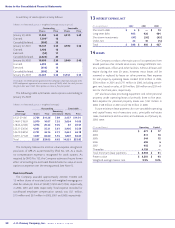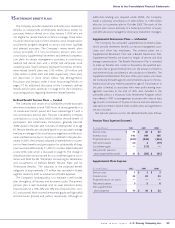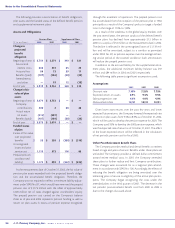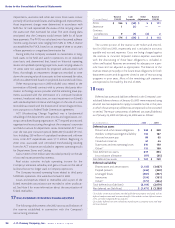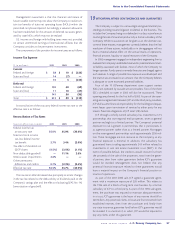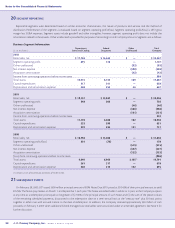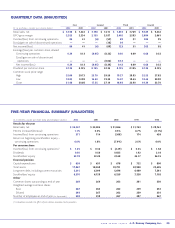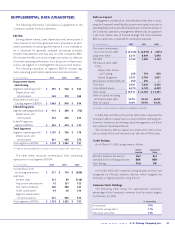JCPenney 2002 Annual Report Download - page 45
Download and view the complete annual report
Please find page 45 of the 2002 JCPenney annual report below. You can navigate through the pages in the report by either clicking on the pages listed below, or by using the keyword search tool below to find specific information within the annual report.
J. C. Penney Company, Inc. 2002 annual report42
CORPORATE CITIZENSHIP
Community Relations
The Company remains committed to investing in community
programs that are important to its customers and its employees.
JCPenney’s commitment focuses on three major endeavors. JCP is a
contributor to JCPenney Afterschool Fund, a charitable organization
committed to providing children with high-quality after-school pro-
grams. JCP supports community health and welfare issues primarily
through support of local United Ways nationwide. JCP annually rec-
ognizes its associates’ personal volunteer endeavors through the
James Cash Penney Awards for Community Service. A more com-
plete review of JCPenney’s community relations efforts is available
online at www.jcpenney.net/company/commrel.
Eckerd focuses on issues that customers and associates have
identified as most important to them: education, health care and
the needs of women and children. Eckerd contributes to organiza-
tions such as Children’s Miracle Network hospitals, United Way
agencies, Juvenile Diabetes Research Foundation projects, camps
for at-risk youths and scholarships for pharmacy students.
Diversity
JCPenney has been a corporate member of the National
Minority Supplier Development Council (NMSDC) since 1972
and continues to invest in the NMSDC’s Business Consortium
Fund, which makes loans to minority-owned businesses. The
Company is a founding member of the Women’s Business
Enterprise National Council. In 2002, the Company’s purchases
from minority-owned and women-owned businesses totaled
$410 million and $263 million, respectively.
Environmental Affairs
The Company’s commitment to doing business in a responsi-
ble manner includes a determination to make environmental,
health and safety considerations an important factor in corporate
decision-making and policy. Copies of “Matters of Principle:
JCPenney and Environmental Responsibility” and “JCPenney
Community Partners” may be obtained as indicated on the inside
back cover of this Annual Report.
CORPORATE GOVERNANCE
The Company is aware that many of its stockholders are inter-
ested in matters of corporate governance. JCPenney shares this
interest and is, and for many years has been, committed to assur-
ing that the Company is managed in a way that is fair to all its
stockholders and that allows its stockholders to maximize the
value of their investment by participating in the present and
future growth of JCPenney. JCPenney believes its corporate gov-
ernance standards for the most part meet or exceed those being
proposed by the Securities and Exchange Commission and
the New York Stock Exchange. The Corporate Governance
Committee of the Board of Directors reviews developments in
the governance area as they affect relations between the
Company and its stockholders and makes recommendations to
the full Board regarding such issues.
Independent Board of Directors
In keeping with its long-standing practice, the Company’s Board
continues to be an independent board under any reasonable defi-
nition. Nominees for directors are selected by a committee com-
posed entirely of directors who are not Company employees. The
wide diversity of expertise, experience and achievements that the
directors possess in business, investments, large organizations and
public affairs allows the Board to most effectively represent the
interests of all the Company’s stockholders.
Independent Committees
The Audit Committee, Corporate Governance Committee,
Finance Committee and Human Resources and Compensation
Committee, all standing committees of the Board of Directors, are
composed entirely of directors who are not employees of the
Company. These committees, as well as the entire Board, consult
with, and are advised by, outside consultants and experts in con-
nection with their deliberations as needed.
Executive Compensation
A significant portion of the cash compensation received by the
Company’s executive officers consists of performance incentive
compensation payments derived from compensation plan
“values.” The amounts of these plan values are directly related to
the sales and earnings of the Company and, consequently, vary
from year to year based upon Company performance. The total
compensation package for the Company’s executive officers is set
by the Human Resources and Compensation Committee, which
is composed entirely of directors who are not employees of the
Company and which receives the advice of independent outside
consultants. Please refer to the Company’s 2003 Proxy Statement
for a report from the Company’s Human Resources and
Compensation Committee describing how compensation deter-
minations are made.
Confidential Voting
The Company has a long-standing confidential voting policy.
Under this policy, all proxy (voting instruction) cards, ballots and
vote tabulations, including telephone and internet voting
records, that identify the particular vote of a stockholder are kept
secret from the Company, its directors, officers and employees.
Proxies are returned directly to the tabulator, who receives and
tabulates the proxies. The final tabulation is inspected by inspec-
tors of election who are independent of the Company, its direc-
tors, officers and employees. The identity and vote of a stock-
holder is not disclosed to the Company, its directors, officers or
employees, or any third party except (1) to allow the independ-
ent election inspectors to certify the results of the vote; (2) as
necessary to meet applicable legal requirements and to assert or
defend claims for or against the Company; (3) in the event of a
proxy solicitation based on an opposition proxy statement filed,
or required to be filed, with the Securities and Exchange
Commission; or (4) in the event a stockholder has made a writ-
ten comment on such material.


